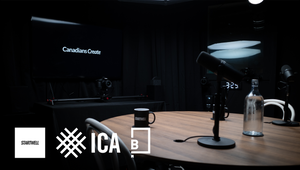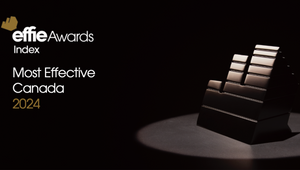
Canada’s Keys to 2025 Effies Success

Since 2018, the Effie Awards have been an important milestone in the annual Canadian adland calendar, serving as an occasion for reflection and celebration of local marketing effectiveness. Brought to the country by the Institute of Canadian Agencies (ICA), it’s been a great chance for agencies and brands alike to prove the power of good strategy, creative and results on both a national and international level – something that Canada desperately needs more of in its bid to prove what locals already know: the excellence of Canadian advertising.
Now in its seventh outing, the 2025 Effie Awards Canada Call for Entries is open for submissions. With the early deadline being January 24th, and the final deadline on March 21st, there’s no better time to reflect on the successful campaigns of the past year and get cracking on case studies.
But, how should one go about this? Nobody wants to enter a sloppy case study, after all, so what should competitor agencies and brands be aware of when gearing up to throw their hats in the ring? These are two crucial questions which, this year, there are some definitive answers to. Specifically, with Adam Reeves (chief creative officer of TBWA\Group Canada) and Kate Torrance (VP, head of brand, content and communications at SickKids Foundation) set to reprise their roles as Effie co-chairs for the second year in a row, LBB’s Jordan Won Neufeldt took the opportunity to pick their brains, finding out exactly what people need to consider ahead of this year’s event.
LBB> Kate, Adam, congratulations on being re-appointed co-chairs of the Effie Awards Canada. Seeing as this is the second year in a row, what are the most important lessons you learned last time, and how will you be applying them?
Kate> I’ll say this opportunity reminded us about the incredible talent in Canada – not just through the submissions, but in the wonderful folks who volunteered as jury members. However, because everyone is so ‘Canadian’ (in other words, kind) it can sometimes take some work in the room to get a good dialogue going and get all voices contributing.
All in all, we’re glad to have had some more experience moderating so that this year, we can ensure all jury members get to share their points of view and aim to ask more provocative questions to pressure test the decisions.
Adam> Judging is hard, and chairing the judging is harder. But it’s that scrutiny that makes the Effies so special. The bar is so high, and the cases must showcase strategy, creative and results – it can be a lot of information and considerations to digest.
We had to play good cop, bad cop last year a bit – I think we’ll bring that approach back this year as it helps create space for all the judges to share their opinions and creates healthy debate about the work.
LBB> Of course, leading the judging is no small task. How do you approach something like this, while ensuring a fair process and discussions?
Kate> The team from the ICA trained Adam and I well, and they are there to support us through the judging. The key is to keep going back to the case criteria as the guide; what gives the Effies such a high bar is the case study format and, like Adam said, that focus on challenge, strategy, creative and results.
Adam> I would say it’s so important to continue to remind judges to leave their own biases and category experiences at the door. Judge the case study, and not what you may or may not have seen of the work in the marketplace.
LBB> Let’s talk more about the work. Seeing as the entries are always very competitive, what will the two of you be hoping to see when discerning the best of the best?
Adam> I’m hoping to see more entries that showcase not just effective work with good creative, but effective work with breakthrough creative. One of my favourite questions we asked judges during moderation was, ‘Does this work make you jealous? Do you wish it was yours?’. This question really gets people thinking and ensures we keep to the high standards Effies is known for.
Kate> I’m hoping to see more case study submissions that show a strong connection between the challenge/objectives and the results. You’d think that would be a no-brainer for a show like the Effies, but many of even the better cases require the judges to go back and forth between these two sections of the case because it’s not clear. The best submissions feel tight and focused, and the results clearly tie back to the stated objectives.
Equally so, the best cases also take time to rule out other factors that could have impacted the results – too many submissions glaze over that part, and you don’t want judges speculating about other things such as pricing or promotion and their impact on the results.
LBB> Building on this, is there any further advice you’d like to offer clients and agencies as they prepare their cases?
Adam> Write the cases for the work you’re most proud of – not the mediocre work that happened to meet the business goals.
Kate> I’ll add to that: invest the time on the cases of your best work. This is a case study competition and the best, most effective work in the world might not make it through if the case study is poorly written or too complicated to follow.

LBB> At last year’s Canadian Marketing Effectiveness Summit, put on by the ICA and Effie Canada, it was reiterated that case studies had room for improvement. Seeing as you’ve also mentioned this, what should competitors keep in mind this time out?
Kate> The best cases were not always the ones with the best creative or the most outstanding results. Even if the creative was breakthrough and the results were strong, if the case was confusing or created doubt in the minds of the jury, then it wouldn’t perform as it should.
Adam> Even though we remind judges to leave their biases at the door, it’s clear that they still creep in, and many have strong opinions about where it is easier or harder to do good work (e.g. not-for-profit versus CPG). But when a case is clear, well-written, and covers all the bases, it is easier for a judge to leave behind their own perspectives or experiences and focus only on the case.
LBB> Specifically, Adam, during your panel you mentioned that many submissions were about short term impact, and more work needed to focus on the long term. How can agencies better showcase this?
Adam> Many of the cases reported results against very short periods of time – so work that was in market for only a few weeks, and then those results. With something like that, there’s no real sense of the impact of the work on the brand or business, but rather just a spike in a moment in time. This creates skepticism with the judges in the room.
What people need to be aware of is that there’s a sustained success category that allows brands to showcase the impact of investment in brand building and smart marketing over time. Presently, it’s underutilised, and Canada definitely has work that could shine here.
Kate> I can vouch for that as SickKids has won in that category before!
LBB> Kate, in your opinion, how can brands better work with their agencies to demonstrate this effectiveness? Speaking from personal experience, what would you be looking for in that position?
Kate> Write your case in partnership with your client and give yourselves and your clients lots of time to get it right. Clients and brands should help their agencies specifically with the challenge/objectives section of the case. They can set the context better than the agency can because they live in their category every day.
Finally, ensure the metrics that are important to the brand (and that you actually track) are included, so then it’s easy for the agency to get the corresponding results data from you.
LBB> How do you feel like last year’s winners represent the amalgamation of this? Is there anything that can be learned?
Kate> It took us time to align on winners last year, and it always came down to two things – either really great and effective work, but the case study was lazy or had glaring holes, or great case studies that showcased amazing results, but the judges felt the creative wasn’t representative of Canada’s best.
Adam> We’re hoping that this year, we’ll see the best case study writing against the best creativity we know Canada is capable of.
LBB> Another big point from last year’s event was that the work needs to not just gun for the big prize in Canada, but globally. Do you think Canada has a shot at doing that this year?
Adam> Canada always has a shot. We consistently punch above our weight when it comes to breakthrough, effective creative for a market our size – especially one where pickup from US work is still so easy and prevalent.
Kate> If Canadian agencies and clients partner up on their case study submissions and write them brilliantly while putting their best work forward, then there’s no reason why work coming from our country can’t take the top prize globally.
LBB> Finally, what are you most excited about for this year’s Effies?
Kate> It’s a privilege to see Canada’s best work all in one place. And it’s great to meet the best and brightest talent who volunteer as judges through the process.
Adam> It’s an honour to be a chair – it’s inspiring to see the work, and it’s fun!













